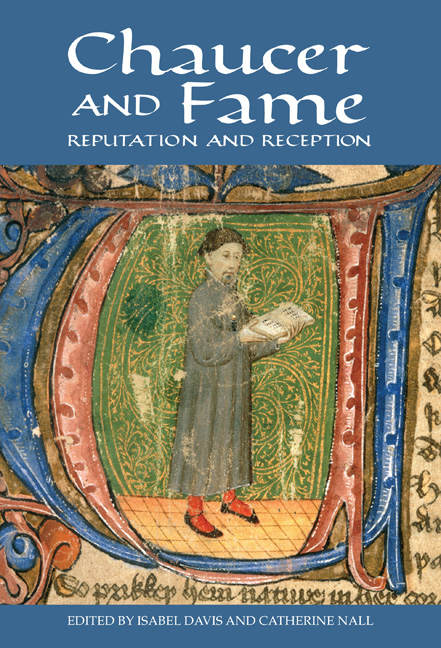Book contents
- Frontmatter
- Contents
- List of Illustrations
- List of Contributors
- Acknowledgements
- Introduction
- 1 Chaucer Joins the Schiera: The House of Fame, Italy and the Determination of Posterity
- 2 ‘I Wolde … han Hadde a Fame’: Dante, Fame and Infamy in Chaucer’s House of Fame
- 3 ‘And kis the Steppes where as thow Seest Pace’: Reconstructing the Spectral Canon in Statius and Chaucer
- 4 ‘I Nolde Sette at al that Noys a Grote’: Repudiating Infamy in Troilus and Criseyde and The House of Fame
- 5 The Early Reception of Chaucer’s The House of Fame
- 6 Fame’s Penitent: Deconstructive Chaucer Among the Lancastrians
- 7 After Deschamps: Chaucer’s French Fame
- 8 ‘Fresch Anamalit Termes’: The Contradictory Celebrity of Chaucer’s Aureation
- 9 Chaucer the Puritan
- 10 Revenant Chaucer: Early Modern Celebrity
- 11 Ancient Chaucer: Temporalities of Fame
- Bibliography
- Index
- Chaucer Studies
Introduction
Published online by Cambridge University Press: 21 May 2021
- Frontmatter
- Contents
- List of Illustrations
- List of Contributors
- Acknowledgements
- Introduction
- 1 Chaucer Joins the Schiera: The House of Fame, Italy and the Determination of Posterity
- 2 ‘I Wolde … han Hadde a Fame’: Dante, Fame and Infamy in Chaucer’s House of Fame
- 3 ‘And kis the Steppes where as thow Seest Pace’: Reconstructing the Spectral Canon in Statius and Chaucer
- 4 ‘I Nolde Sette at al that Noys a Grote’: Repudiating Infamy in Troilus and Criseyde and The House of Fame
- 5 The Early Reception of Chaucer’s The House of Fame
- 6 Fame’s Penitent: Deconstructive Chaucer Among the Lancastrians
- 7 After Deschamps: Chaucer’s French Fame
- 8 ‘Fresch Anamalit Termes’: The Contradictory Celebrity of Chaucer’s Aureation
- 9 Chaucer the Puritan
- 10 Revenant Chaucer: Early Modern Celebrity
- 11 Ancient Chaucer: Temporalities of Fame
- Bibliography
- Index
- Chaucer Studies
Summary
What did Geoffrey Chaucer really do to Dido (to paraphrase the title of C. S. Lewis’ seminal essay on Chaucer's indebtedness to and independence from Boccaccio's Filostrato, in Troilus and Criseyde)? In the fourth book of Virgil's Aeneid, Dido's entry into the cave of Aeolus with her lover, Aeneas, unwittingly conjures up a monstrous personification of Fama, halfwoman and half-bird with many eyes and mouths, of whom Dido herself is the first casualty. Dido's sexuality and her ethical conduct thus unleashes the theme of fame in one of the foundational (indeed, one of the most reputed) texts of Western literature. Philip Hardie has said of this episode that it is ‘[t] he central text for the history of fama in the Western literary tradition’; not only is it a ‘major intertextual ingathering … of the prior traditions of fama’, including those from Hesiod and Homer, but also it ‘creates an image that determines much of the future course of the representation, both verbal and visual, of fama’.
Here, before an overview of the volume and its contents, I shall explore the intertextuality of Chaucer's discussion of fame; more particularly I am interested in gendered reputations, including that of Dido. My concern is to demonstrate many of the themes which are considered in the essays in Chaucer and Fame, questions raised around fama in its many medieval senses: of name, reputation and fame. I intend to bind up, in the same way as do the essays that this introduction prefaces, the issues of fame with Chaucer's engagement with other literature, both old and much newer. I shall start by selecting, as C. S. Lewis does, Chaucer's engagement with Giovanni Boccaccio as both a centre point and a sore point among other intertextual tussles. That relationship is particularly strained by Chaucer's decision to leave his Italian contemporary unnamed, left out of his catalogues of influence. Alcuin Blamires and Elizaveta Strakhov, in their contributions to this book, also consider Chaucer's relationship to Boccaccio, but all these essays together investigate a full range of intertexts for Chaucer's work, finding rich networks of allusion, both between Chaucer's works and his sources, and also between the work of those who came after him, forming and framing Chaucer's own literary fame.
- Type
- Chapter
- Information
- Chaucer and FameReputation and Reception, pp. 1 - 20Publisher: Boydell & BrewerPrint publication year: 2015

